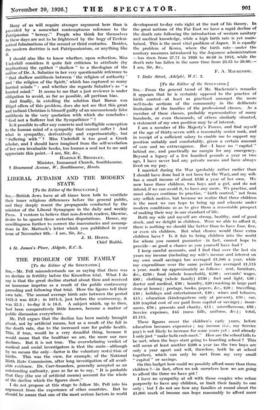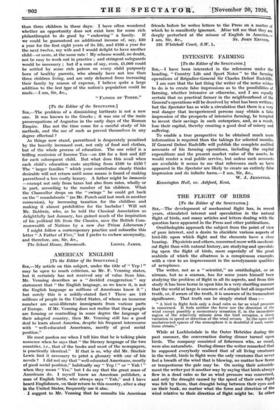[To the Editor of the Ser.crvron.]
SIR,—From the general trend of Mr. Mackenzie's remarks it appears that he is certainly opposed to the practice of birth control—at least as practised amongst the more well-to-do sections of the community in the deliberate limitation of the families of the professional classes. As a member of these classes, probably representative of many hundreds, or even thousands, of others similarly situated, a statement of my own position may be of interest.
I am a member of His Majesty's Forces, and find myself at the age of thirty-seven with a reasonably senior rank, and
in receipt of a sufficient salary to enable me to support my position suitably and comfortably, given a certain amount of care and no extravagance. But—I have no " capital behind me, and practically no margin for any emergency. Beyond a legacy of a few hundred pounds a year or two ago, I have never had any private means and have always lived on my pay.
I married during the War (probably rather earlier than I should have done had it not been for the War), and my wife has a small income of about £150 a year of her own. We now have three children, two boys and a girl, and do not intend, if we can avoid it, to have any snore. We practise, and must always continue to practise, " birth control," not from any selfish motive, but because we realize that three children is the most we can hope to bring up and educate under modern conditions so as to give them a reasonable prospect of making their way in our standard of life.
Both my wife and myself arc strong, healthy, and of good stock, and we delight in children. IVere we able to afford it, • there is nothing we should like better than to have four, five, or even six children. But what chance would those extra children have ? Is it fair to bring children into the world for whom you cannot guarantee—in fact, cannot hope to provide—as good a chance as you yourself have had ?
I keep careful accounts, and I find that over the last six years my income (including my wife's income and interest on my own small savings) has averaged £1,180 a year, while my expenditure over the same period has averaged £1,115 a year, made up approximately as follows : rent, furniture, &c., 1230 ; food (whole household), 1.200 ; servants' wages, /80 ; clothing (whole family) 1130 ; fuel and light, /50 ; doctor and medical, £30 ; laundry, £20 (washing in large part done at home) ; postage, books, papers, &c., £20 ; travelling, 140 ; holidays and entertainment, £40 ; wines and tobacco, 115 ; education (kindergartens only at present), 130 ; car, £50 (capital cost of car paid from capital or savings) ; insur- ances, £70 ; presents and charity, 115 ; miscellaneous, 250 ; Service expenses, £45 (mess bills, uniform, &c.) ; total, £1,115.
These figures cover the children's early years, before education becomes expensive ; my income (i.e., my Service pay) is not likely to increase for some years yet ; and already I only just " make both ends meet." How are the school bills to be met, when the boys start going to boarding school ? This will mean at least another £200 a year (as the two boys are only a year apart and will, therefore, both be at school together), which can only be met from my very small " capital " or savings.
On this budget how could we possibly afford more than three children ?—in fact, often we ask ourselves how we are going to afford the three we have got !
I have no sympathy at all with those couples who refuse purposely to have any children, or limit their family to one only ; but I do not see how any families at round about the £1,000 mark of 'income can hope reasonably to afford more than three children in these days: I have often wondered whether an opportunity does not exist here for some rich philanthropist to do good by " endowing " a family. If we could be guaranteed an additional income of, say, £50 a year for the first eight years of its life, and £100 a year for the next twelve, my wife and I would delight to have another child—or more, at the same rate ! My scheme would, no doubt, not be easy to work out in practice ; and stringent safeguards would be necessary ; but if a sum of say, even, £1,000 could be settled by some rich patron on every child purposely born of healthy parents, who already have not less than three children living, and are only debarred from increasing their family by reason of expense, I believe quite a large addition to the best type of the nation's population could be made.—I am, Sir, &c.,
" FATHER OF THREE:'































































 Previous page
Previous page